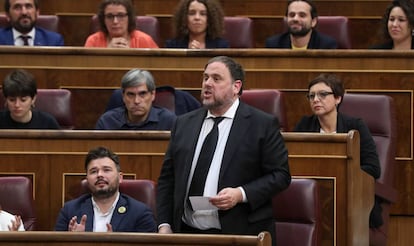Spanish government files complaint over UN report on jailed Catalan politicians
A working group concluded that the detention of three of the defendants in the Supreme Court trial was “arbitrary,” and that the illegal referendum was within Spanish law

The acting Spanish government on Friday filed an official complaint over a report from a United Nations working group that has concluded that the detention of three of the Catalan independence leaders ahead of their trial for their role in the secessionist drive of 2017 was arbitrary.
The former deputy premier of the northeastern Spanish region, Oriol Junqueras of the Catalan Republican Left (ERC), and the former leaders of two civil pro-independence associations, Jordi Sànchez and Jordi Cuixart, were among a number of defendants ordered to be held in custody in the wake of the illegal referendum on secession from Spain held in October 2017 and the subsequent unilateral declaration of independence passed by the regional parliament. It is the pre-trial custody of these three men that the UN report focuses on.
The Foreign Ministry went as far as to say that the timing of the publication of the report was seeking to influence the ongoing trial
Five of the other politicians involved in the secessionist drive – including then-premier Carles Puigdemont – fled Spain in the wake of the events of 2017 and are still wanted for arrest by the Spanish authorities. Flight risk and the possibility of reoffending were among the reasons that prompted the Spanish Supreme Court to order that nine defendants in total be held behind bars until the trial concludes.
Earlier in the week, the acting Spanish government of Socialist Party (PSOE) Prime Minister Pedro Sánchez reacted harshly to the UN working group’s findings, stating that by calling for the three men to be released from jail while their Supreme Court trial is still in progress, the authors were not respecting the separation of powers in Spain. The Foreign Ministry also went as far as to say that the timing of the publication of the report was seeking to influence the ongoing trial, and voiced its “doubts over the independence and impartiality” of the authors.
“It is particularly serious that this working group has released its report shortly before the Supreme Court case against the defendants is about to pass judgment,” a statement from the ministry read. “These are deplorable circumstances that could be interpreted as interference in an ongoing criminal process.” The three men in question are facing charges including sedition, rebellion and misuse of funds and could face up to 25 years in jail for their role in the secessionist drive.
The Catalan regional premier, Quim Torra, called the opinion of the experts, who do not speak in the name of the UN, “devastating”
The ministry went on to call on the UN Working Group on Arbitrary Detention to “reinforce the rigor, independence and equanimity of its work and stay alert to manipulation attempts.”
The Spanish government pointed out that practically at the same time as the non-binding opinion was published, the European Court of Human Rights had rejected a case filed by pro-independence leaders covering an alleged breach of their human rights – a conclusion that was the opposite to the findings of the UN working group. “These procedures, which are hugely important, cannot be perverted by actions such as this one,” the secretary of state for global Spain, Irene Lozano, told EL PAÍS. “They are being manipulated.”
The Catalan regional premier, Quim Torra, called the opinion of the experts, who do not speak in the name of the UN, “devastating,” saying that he would be requesting that the public prosecutor call on the Supreme Court to “drop all of the accusations and immediately free” the politicians being held in custody.
The 19-page report was passed on to Spain on May 27, despite having been approved on April 25
The UN working group that produced the opinion examines cases of possible breaches of rights in detentions. The lawyers of the three men in question took their clients’ case to the group, which concluded that the jailing of Junqueras and the “Jordis,” as the two men are known, had more to do with their pro-independence views than real offenses. The text omits the fact that the October 1 referendum was declared unconstitutional by Spain’s top courts, and goes as far as to suggest that such a plebiscite is permitted under Spanish law, which is not the case.
The 19-page report was passed on to Spain on May 27, despite having been approved on April 25, according to the date on the last page of the document. The text echoes many of the arguments used by supporters of Catalan independence, including claims that the three men “were accused of sedition in relation to a peaceful protest on September 20 and 21, 2017,” in reference to the altercations that took place outside the Catalan economy ministry while the Civil Guard tried to carry out a search there.
The report dedicates nearly six pages to the pro-independence side of events, compared to barely three covering the central government’s views.
On Friday, it emerged that the Spanish government had sent three notes verbales – a communication used for a diplomatic complaint from one country to another institution or state – over the irregularities it had observed in the procedure, according to sources from the Foreign Ministry. The ministry is calling for two of the three UN working group members to be recused.
Acting Foreign Minister Josep Borrell is due today to send a protest letter to the UN's high commissioner for human rights
Conflict of interest
The first note alludes to the fact that the document was leaked to the lawyers of the pro-independence leaders at the same time as it was delivered to the Spanish government – normally there should be a delay of 48 hours before this is done. The other two notes call for the opinion from the working group to be revised. The Spanish government is basing this on a conflict of interest between the members of the group and the lawyer Ben Emmerson, who is representing Junqueras and the Jordis. At least two members of the working group – the Mexican José Guevara, who signed the text, and the South Korean Seong-Phil Hong – had worked previously with Emmerson.
Spain is calling for the pair to be recused. Acting government spokesperson Isabel Celaá said on Friday that if the relationship between the lawyer and the working group had been known, their “abstention would have been demanded.” Acting Foreign Minister Josep Borrell is due today to send a protest letter to the UN's High Commissioner for Human Rights, Michelle Bachelet, to express his unease over the situation.
English version by Simon Hunter.
Tu suscripción se está usando en otro dispositivo
¿Quieres añadir otro usuario a tu suscripción?
Si continúas leyendo en este dispositivo, no se podrá leer en el otro.
FlechaTu suscripción se está usando en otro dispositivo y solo puedes acceder a EL PAÍS desde un dispositivo a la vez.
Si quieres compartir tu cuenta, cambia tu suscripción a la modalidad Premium, así podrás añadir otro usuario. Cada uno accederá con su propia cuenta de email, lo que os permitirá personalizar vuestra experiencia en EL PAÍS.
¿Tienes una suscripción de empresa? Accede aquí para contratar más cuentas.
En el caso de no saber quién está usando tu cuenta, te recomendamos cambiar tu contraseña aquí.
Si decides continuar compartiendo tu cuenta, este mensaje se mostrará en tu dispositivo y en el de la otra persona que está usando tu cuenta de forma indefinida, afectando a tu experiencia de lectura. Puedes consultar aquí los términos y condiciones de la suscripción digital.









































